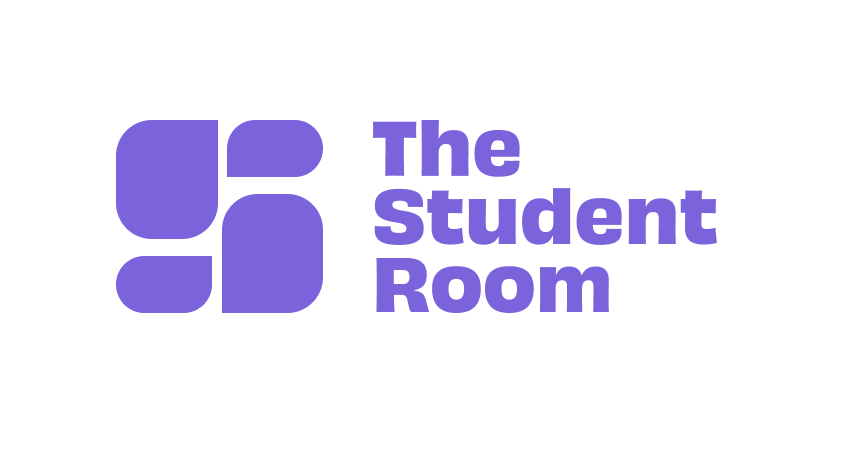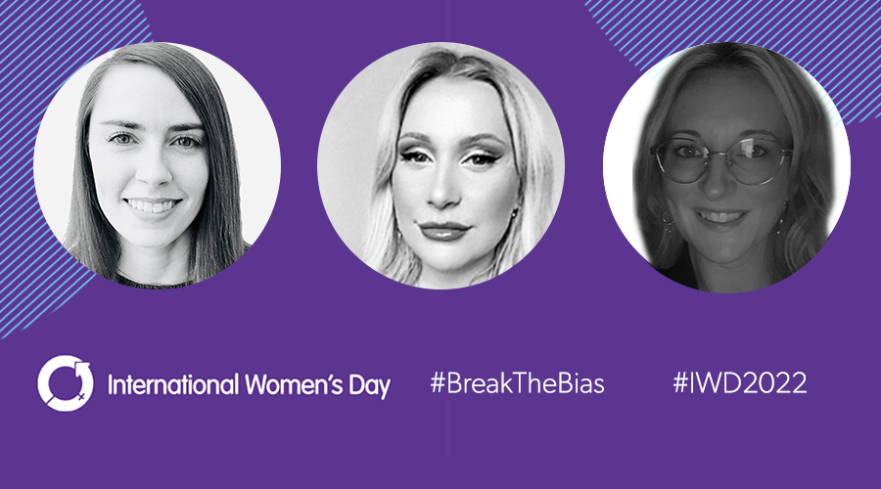8th March is International Women’s Day and this year the theme is #BreaktheBias. We spoke to three inspiring women who work at The Student Room to uncover their unique experiences. (From left) Charlotte, Amy and Claire are united in standing up for women and being strong role models for anyone who aspires to work in STEM or business. Here are their stories, and their hopes for the future.
What does your role involve at the Student Room and what’s the best part about your job?
Amy: As Product Designer at The Student Room I am focused on improving the experience for the end-user, whilst also contributing to business goals. My role involves exploring potential problems for users and identifying creative solutions. The best part of my job is the opportunity to help young people. I feel very privileged to be able to speak to our users directly and really understand their experience – not only on the site but in their daily lives too. Since working at The Student Room I have been in awe of the intelligence, awareness and drive of young people – this really motivates me to provide them with the best possible safe space where they can connect and receive support.
Claire: As Head of Marketing at The Student Room, I lead the marketing team and I am responsible for creating the strategies, project road maps and results-oriented marketing and communications plans targeting our student end-user audiences. The best part of my role is working with such a dedicated and passionate team of experts. Everyone really cares about supporting students and that means I get to do what I love and am able to see the difference it makes first-hand.
Charlotte: I am a Senior Frontend Developer at The Student Room, so I am responsible for building what you see on the site and making sure that website visitors can easily interact with our products. I do this by building features to make the user experience better, by fixing parts of the users’ journey that are perhaps not so effective and making our sites as accessible as possible. The best part of my job is being able to create something from scratch and seeing that feature out in the world with real people using it. Frontend development is great as you get that instant feedback of seeing something coming to life on your screen.
Is gender bias something you have ever experienced in the workplace?
Amy: Early in my career it came to light that a male colleague was being paid more than I was. We were doing the same role, so I naively emailed HR questioning the lack of parity and received a response essentially telling me that if I didn’t like it, I could leave. I didn’t leave. As a young woman I had spoken up (as we are encouraged to do) and trusted that by calling attention to the issue, something would have to be done about it – and that wasn’t the case.
Claire: I’ve experienced gender bias in the workplace in my career, particularly around male colleagues evidently being paid significantly more whilst doing exactly the same role. I was embarrassed and really disappointed, feeling I had no choice but just to accept this.
Charlotte: It’s no secret that tech is a very male-dominated field, and up until recently I’ve often been the only woman on a development team. With that comes team culture adjustments, where ‘banter’ amongst a 100% male team can actually be harmful when the team becomes more diverse. In the past I’ve experienced being spoken over in meetings, being left out of team meetings as I “wouldn’t understand the content”, having an idea of mine dismissed only for a male colleague to get praised for the same idea. It’s not ok, and I have been vocal about addressing these issues to make workplaces a safe place for diverse teams to thrive.
What can employers do to overcome gender bias in the workplace?
Amy: Employers must be able to accept that gender bias exists in their organisation and be open to accepting some responsibility. I don’t believe any employer sets out to foster a culture of discrimination – we all have preconceptions, and they are generally unconscious. However, employers must continually question the assumptions being made in order to establish whether gender bias is present, and if so, they must make a conscious effort to challenge those assumptions at every turn.
Claire: Accepting and understanding unconscious bias in the workplace is so important. All employers should offer unconscious bias training for their teams – this can really open up the communication channels for honest and transparent discussion. Every effort should be made to ensure a diverse workplace. This should be embedded in the company’s values.
Charlotte: Gender bias is a very isolating experience, so it’s important for employers to accept responsibility when measures to safeguard against it aren’t working. It’s not being afraid to acknowledge when things aren’t right, and then working to make it better. It’s mirroring inclusive behaviours and being an active ally to women on their team.
What are you most proud of in your career so far?
Amy: I’m actually very proud of how my confidence has grown throughout my career so far. Your behaviour teaches other people how to treat you, and I saw a big change when I realised that I held that power. I also owe some of that confidence to a few amazing and supportive people I’ve crossed paths with, in the form of colleagues, mentors and friends.
Claire: There are several career highlights, but I’m really proud of being a good role model to my son and daughter. Changing the stereotype that a great career doesn’t mean you can’t be a great Mum and vice-versa. Showing them every day the value of hard work and dedication.
Charlotte: I’m really proud of my perseverance in the face of many challenges throughout my working career. Back in 2017, I retrained to be a developer, leaving behind a career in science. It was long hours and hard work, but now 4.5 years later I’m a Senior Developer. I’ve always been a huge champion of Women in STEM and while I no longer work in science, I’m proud that I’ve been able to succeed in another branch of STEM and be a role model to others.
Who is your favourite female role model and why?
Amy: I’d say my favourite female role model is Debbie Millman. She is best known for hosting the longest running podcast in history – Design Matters, but is also a writer, designer, educator, artist and brand consultant. Debbie has an unwavering commitment to sharing the true value of design with the world – proving it deserving of respect and attention, something that I’ve always wished I could do better with my own influence. She once said, “If you imagine less, less will be what you undoubtedly deserve”, this mindset pushes me to speak up in times where I may be dismissed from the conversation as a creative who just ‘makes things pretty’.
Claire: I greatly admire Deborah James (aka the bowel babe). Deborah was a deputy headteacher until 2016, at the age of 35 she was diagnosed with Stage 4 bowel cancer and her life with her young children and husband was thrown upside down. She has undergone multiple treatments and surgeries and started a blog, ‘bowel babe,’ to debunk the myth that young women don’t get bowel cancer, which in turn became the award-winning and popular weekly column for The Sun online, “Things Cancer Made Me Say“. She is an inspirational fundraiser and campaigner bravely sharing her journey to help and inform others.
Charlotte: My role models are the strong women I have worked with in the past and who I currently work with. These women advocate for their female colleagues daily. They model the attributes that I aspire to, like being fabulous mentors, and are doing the things that scare them on a daily basis (like public speaking, for example). They celebrate each other’s successes and help to lift each other up.
This year’s IWD theme is #BreaktheBias. What does that mean for you?
Amy: Having come across bias again and again as a woman in the tech industry, sometimes it’s hard to imagine a world without it. To me #BreaktheBias allows us to see that a workplace without bias is a real possibility, but we all need to be invested in change for it to happen and raising awareness will really make a difference.
Claire: Break the bias for me means educating people and primarily our young people to the careers that are available to them. Breaking down any barriers and pre conceived ideas of male dominated industries and showing the opportunities available to all.
Charlotte: To me, #BreaktheBias is a consistent effort by everyone to rid the world and the workplace of bias, stereotypes, and discrimination.
#BreaktheBias
At The Student Room, we have seventy-eight employees: forty males and thirty-eight females. Of those with managerial duties, we have a 50/50 split. Want to work with us to help young women (and all students) fulfil their potential?
Get in touch:
0800 999 3222
hello@thestudentroom.com

